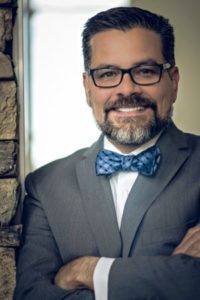The head of the Baptist Center for Ethics declared May 23 that he welcomes full inclusion of LGBTQ Christians into the life and leadership of congregations.
“I have come to the conclusion that God created humanity with various sexual identities and orientations,” BCE Executive Director Mitch Randall wrote in a column on the organization’s flagship website EthicsDaily.com. “Therefore, the church should not hinder LGBTQ Christians from full inclusion into the body as God made them.”

Mitch Randall
The stance sets him apart from his predecessor, BCE founding executive director Robert Parham, who died in office in March 2017.
Parham, who launched the free-standing ethics agency in 1991, leaned over the years toward the traditionalist view while more progressive Baptists moved away from using sexual orientation or gender identity as a test for fellowship.
“Why prioritize the LBGTQ issue given the multitude of issues that need addressing and around which consensus exists?” Parham asked in a 2016 column about an “Illumination Project” to review a CBF policy barring the “purposeful hiring of a staff person or the sending of a missionary who is a practicing homosexual.”
“Perhaps a word of caution is needed as CBF (Cooperative Baptist Fellowship) wades into yet another ‘conversation’ about revising the tradition of the church to validate culture’s sexual mores,” he said. “Passing a resolution, making a statement, is always easier at a national convention than in one’s own local church.”
BCE has been a long-standing member of CBF’s network of ministry partners.
Randall, a former pastor elected by the BCE board of directors to succeed Parham in October 2017, said in a column entitled “My Journey to Full Inclusion of LGBTQ Christians” that growing up in conservative Southern Baptist churches he “was taught that God created Adam and Eve, not Adam and Steve.”
At seminary, Randall said, he learned that “while the Bible is sacred and authoritative for Christians, human interpretation must never be canonized over the living Word of God.”
“Humans have a tendency to interpret the Bible through anthropocentric lenses, which perpetuate previously codified orthodoxies established by the powerful,” he wrote. “In other words, we interpret the Bible in ways that favor the powerful establishment.”
As a young pastor, Randall said, he encountered LGBTQ Christians and their relatives during pastoral visits, with recurring themes that gay people do not choose to be the way they are and would change if they could.
Recalling words from a seminary professor about controversy in the first century church over whether Gentile Christians must observe the Jewish custom of circumcision, Randall said he reached the conclusion that “who was I that I could hinder God?”
“If God was calling more and more LGBTQ disciples into the church, who am I to prevent it?” Randall pondered. “Did they have to convert to a certain interpretation like the Gentiles were forced to do? Was the church going to force yet another group of people to wear a ‘mark on the body’ to enter into their community? Was not a ‘mark on the heart’ enough?
“In the end, I decided I was going to stop fighting with God about God’s LGBTQ children.”
The old CBF policy barring the hiring of non-celibate gays came in response to attempts by conservative critics within the Southern Baptist Convention to portray the moderate breakaway group as an extreme, far-left rival out of step with the majority of Baptists in the pew.
After the Illumination Project study, the CBF Governing Board last year adopted a new 256-word hiring policy that does not mention sexual orientation or gender identity.
A separate implementation plan, however, recognized that the organization “will consider human sexuality as one factor among many for some positions, including field personnel, those who supervise field personnel and certain ministry/missions leadership positions at CBF Global in Decatur.”
Citing practices of the “vast majority” of CBF churches, the board said leadership positions would be open only to candidates “who practice a traditional Christian sexual ethic of celibacy in singleness or faithfulness in marriage between a woman and a man.”
– This story was updated May 30, including corrections in the headline and first paragraph.
Previous stories:
Ethicist urges caution about changing CBF hiring policy
Moderate Baptist ethicist Robert Parham dies
Oklahoma pastor tapped to lead CBF-related ethics group
